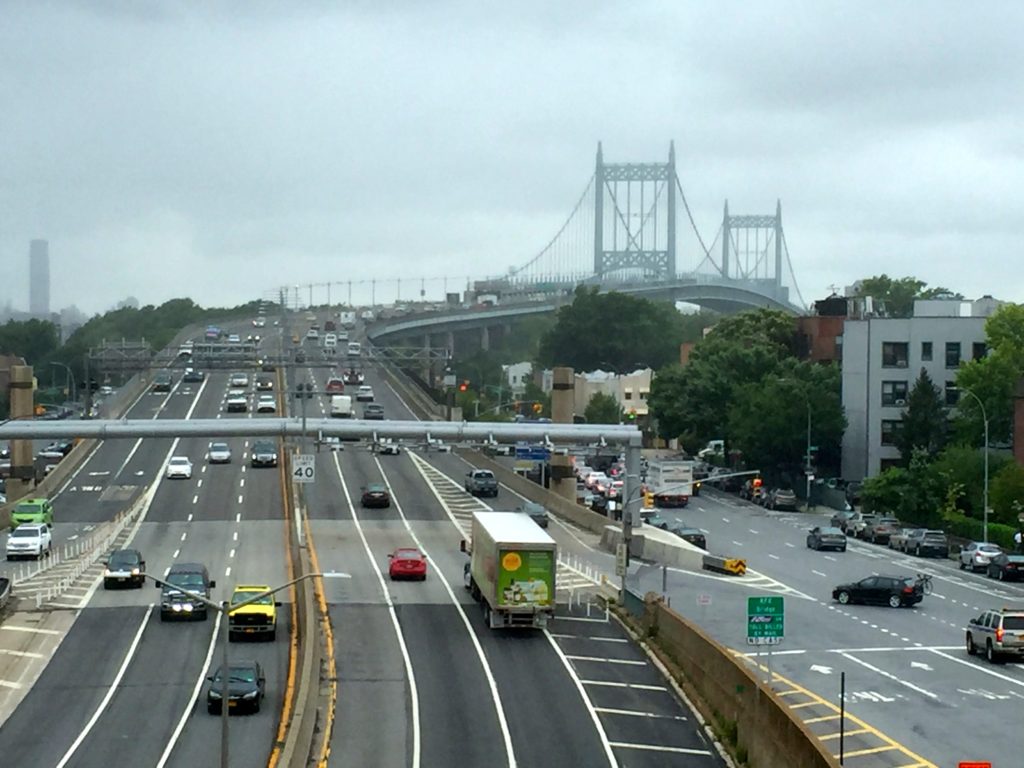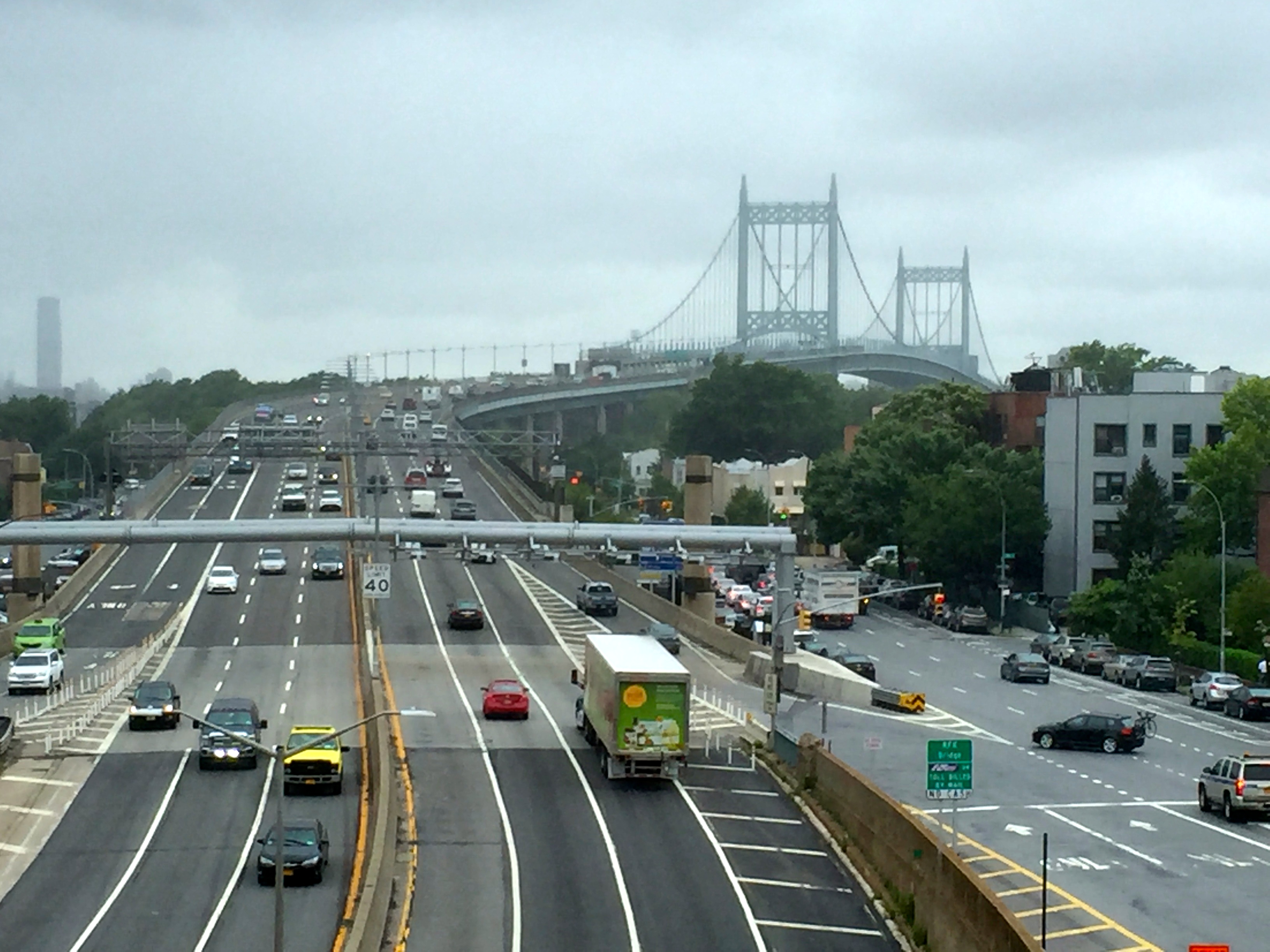
(The RFK Bridge — formerly the Triboro — viewed from the Astoria Blvd. elevated-train platform in Queens. The sight of it alone filled me with anxiety.)
By Tom Robotham
In mid July, I took off on a road trip to the Big Apple, upstate New York and New England. It was a great journey in many respects. I had nice visits with my kids, both of whom live in the city, my sister and brother-in-law, and several old friends. The highlight was a 4-night stay with a childhood buddy and his family in a lovely old house on Lake Dunmore, near Middlebury Vermont. I reveled in the mornings there, especially, when I would rise before anyone else, brew a pot of coffee, then, with mug in hand, make my way down the steep hill from the house to the lakefront and sit in blissful solitude in an Adirondack chair, listening to the loons. And yet, in spite of this, I was dogged by fear.
The trouble started on the way up. As I was crossing the Bay-Bridge Tunnel, I suddenly started feeling light-headed and had to pull over briefly at one of the emergency parking areas. Fortunately, the feeling passed quickly, and I resumed my drive across the span, then up 13. I’ve driven that route countless times, and while it can be tedious it also has its pleasures—some interesting sites, and plenty of time to enjoy the music I love on the car stereo. It’s always been a good feeling, too, when I reach the Delaware Memorial Bridge, a significant milestone reminding me that I’m halfway to my destination.
This time was different. As I made my way up the bridge’s steep slope toward the tall gray towers I was overcome with a panic attack. It was the strangest thing. I remember crossing it as a young child when my family and I would take our annual trip to Tallahassee to see my grandparents, and it was a bit scary. As an adult, though, I’d never thought anything of it.
This time it was awful. My anxiety grew so intense that I had trouble swallowing, and I felt as if I might black out at any moment. To my great relief, the feeling began to subside as soon as I crossed the bridge’s crest, and it nearly disappeared entirely when I hit the turnpike. I say nearly because I knew that I had one more bridge to cross—the Tappan Zee, which leads from the New York Thruway to White Plains, NY, where my sister lives.
The Tappan Zee is long but flat, so I hoped I’d be ok this time. Not so much. Within seconds after hitting the on-ramp, I began to feel the anxiety again. I quickly called a friend (my car is equipped with a speaker phone that I can dial by voice command), and the sound of her soothing voice calmed me a bit.
But what the hell?
Shortly after I got to my sister’s place, I Googled “bridge anxiety” and learned that it is quite common. There’s even a name for it: Gephyrophobia. It’s so common, in fact, that the New York Thruway Authority will arrange to drive you over the Tappan Zee if you call 24 hours in advance.
The thing is, I’d never had phobias of any kind—and I never imagined that I might suddenly develop one in late mid-life. The way I see it, there must be some deeper meaning to it—and I think I’ve hit on a possible explanation.
For some time now, I’ve been deeply dissatisfied with my life. I’ve felt stuck in my routine, torn between the sense of security it offers on the one hand, and the desire on the other to live life more adventurously—to travel to unfamiliar places, do more with my writing and music, and boldly seize opportunities, even if they scare me.
When I was talking with a friend about this not long ago, he said it reminded him of Eliot’s “Love Song of J. Alfred Prufrock”: “Do I dare disturb the Universe?”
The relationship between this feeling and the symbolism of a long, tall bridge seems fairly obvious to me. When you drive over a span like the Delaware Memorial, you’re both scaling a great height and crossing over into new territory. These marvels of engineering, moreover, are testaments to the awesome capacity of the human mind—the contemplation of which can be both exhilarating and frightening. As Marianne Williamson put in her book A Return to Love, “Our deepest fear is not that we are inadequate. Our deepest fear is that we are powerful beyond measure.”
I would amend that, though, to say this: Perhaps our deepest fear is that we are powerful beyond measure but will end up squandering that power. This, in fact, is the theme of one of my favorite films, Defending Your Life, in which the main character, played by Albert Brooks, dies at the beginning of the movie and goes to a way-station in the afterlife called Judgment City, where people are put on trial to determine whether they’ve lived life on earth to the fullest. If so, they move on to a new plane of existence in the universe; if not, they are sent back to live another life on earth. The message of the movie is that there is only one thing that prevents us from living this life to the fullest: fear.
Fear, of course, can be a good thing in certain situations. In truly dangerous circumstances like battle, I imagine, it causes adrenalin to pump through our bodies and helps us remain on high alert. Left unchecked, though, it can become paralyzing. And let’s face it: In everyday life, it often distorts reality, leaving us with the feeling that we can’t do something that in actuality poses no physical threat: getting up the nerve to ask someone out, for example, speak in public, quit your job—or drive over a bridge.
For me, though, confronting all of these realizations is but a first step. My fear of crossing the Delaware Memorial again on the way home was so intense that I ended up taking the Cape May Ferry instead. I did, of course, have to cross the Bay-Bridge Tunnel again on the way home. I decided to try and cope with it by listening to a mix of some of my favorite driving songs—‘Born to Run,’ Tom Petty’s ‘Running Down a Dream,” and Deep Purple’s ‘Highway Star’—all at full volume while singing along at the top of my lungs with the window open. I still felt some anxiety, not only at the crest point just after Fisherman’s Island but in the tunnels, as 18-wheelers hurtled toward me from the other direction. But the music helped.
I still don’t know entirely why this phobia came on so suddenly, but I suspect it has something to do with the fact that in June I turned 62 and am increasingly aware of my own mortality. None of us knows how long we have left on this earth, but when you hit your 60s it’s hard to shake the sense that time is running out. Prufrock says at one point, “in a minute there is time for decisions and revisions….” And that is his curse—the paralysis that comes on when we chronically second-guess ourselves. The need to take action becomes even more urgent as we age.
I don’t feel badly about myself for taking the Cape May Ferry instead of crossing the bridge; at least I made a decision. The great hazard in life is that suspension of action. Thinking about this, I’m reminded of another analogy: If you have one foot on a boat and one foot on the dock, you’d better make up your mind to either get on the boat or stay put on the dock. If you don’t, you’ll end up in the water.
More often than not, though, it’s better to get on the boat—or cross the bridge—and move toward new horizons. Someday soon, I hope, I will do so again. And if you can relate to this in any way, I hope there are new horizons in your future as well.




